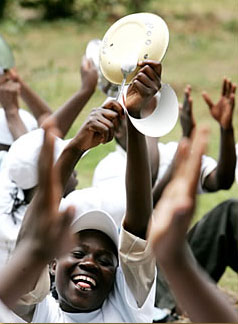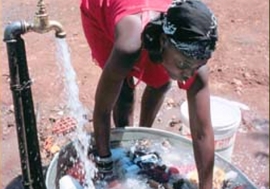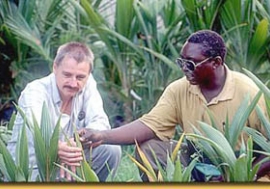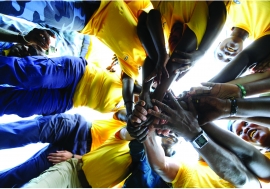Millions of activists for a day
Millions of activists for a day
In October, more than 23 million people — some 3.6 million of them in Africa — set a world record by literally standing up to bring attention to persistent global poverty and to prompt world leaders to act on their promises to eradicate the scourge. The message of the Stand Up Against Poverty campaign, coordinated by the New York–based UN Millennium Campaign, reached people at more than 11,000 events in over 80 countries — cricket fans in Jaipur, India, music lovers at a concert in Harare, Zimbabwe, children in school in Lebanon and soccer supporters in Mexico. Organizers timed the global campaign to coincide with other events marking the International Day for the Eradication of Poverty.
 Kenyans bang spoons against plates during an October 2006 “Stand Up” anti-poverty rally in Nairobi.
Kenyans bang spoons against plates during an October 2006 “Stand Up” anti-poverty rally in Nairobi.“Together, we sent a clear message to our political leaders that we are going to keep pushing them to deliver on aid, on debt cancellation, on trade justice and to provide good and accountable governments,” said Mr. Kumi Naidoo of the Global Call to Action Against Poverty (GCAP). An alliance of community organizations, faith-based groups, trade unions and campaigners in over 100 countries, GCAP was one of the organizations supporting the Stand Up campaign.
Stand Up served as a reminder to the 189 world leaders who gathered for the 2000 Millennium Summit at the UN in New York that they are nearing the halfway mark to 2015 — the date by which they pledged to attain a number of targets in the fight against poverty. Known as the Millennium Development Goals (MDGs), the targets include a reduction in child mortality, primary education for all children and progress in the fight against HIV/AIDS. Stand Up also demanded debt cancellation for poor countries, more and better aid, government accountability in both North and South and “fair” trade rules to allow developing countries to take better advantage of world trade.
“It does not require heroism to help save the lives of people dying in poor countries due to poverty and help to promote economic development,” says UN Special Advisor on the MDGs and head of the UN Millennium Campaign Jeffrey Sachs. “It would just take having our eyes opened. It would take some attention. It would take a breakthrough in our country [the US] from doing nothing to doing something, because we really are, essentially, doing nothing right now.”
The campaign therefore asked ordinary people to do the least they could — stand up and read a statement asking leaders in industrial and developing nations to keep their promises. But a number of participants interviewed by Africa Renewal at an event in New York said they did not understand how their efforts would translate into poverty reduction in poor countries. “How does my standing up put food in the mouth of a starving child in Africa?” asked a UN staff member who requested anonymity.
Broader campaign
By asking individuals to take simple actions, Stand Up gave ordinary citizens the chance to become campaigners, explains Ms. Sylvia Michuli, communication coordinator in the Africa office of the UN Millennium Campaign in Nairobi, Kenya. The idea, she says, was to use Stand Up as a symbolic gesture to draw global attention to poverty and the MDGs.
More than five years after the Millennium Summit, its goals and issues are not only far from the electoral agenda in many countries, but most people have not even heard about them. A 2005 EuroBarometre survey, conducted by the European Commission, found that only 12 per cent of citizens in that region have heard about the MDGs and that “real” awareness of the issues may even be lower. Another study in Canada reports that 62 per cent of those who had heard about the MDGs could not say what they were about.
Stand Up was a useful tool to educate citizens because “it was very easy for ordinary people to get involved,” Ms. Michuli told Africa Renewal. “We managed to get more than 3.6 million people in Africa involved, the first time we have been able to do this.” In addition, she says, it was not an isolated event, but part of a broader effort by a coalition of anti-poverty groups “to put sustained pressure on governments to deliver on their promises.”
‘An invitation to citizens’
In 2005, GCAP held a series of events similar to Stand Up. It asked ordinary citizens around the world to wear white wristbands and demand that their governments act against poverty, explains Mr. Henry Malumo, coordinator of the GCAP coalition in Zambia. “It was an invitation to citizens to take their rightful place and demand good governance,” he told Africa Renewal. He says that for too long Africans have been passive recipients of flawed policies designed by their governments and international partners.
The first of the GCAP-led events, the Make Poverty History (MPH) campaign, was held before the July 2005 summit of the Group of Eight (G-8) industrialized nations in Gleneagles, Scotland. Two others were staged later that year, before the World Summit at the UN and the World Trade Organization’s ministerial meeting in Hong Kong in December.
Whether such campaigns achieve the desired results is the subject of an ongoing study, the Public Perceptions of Poverty survey, funded by the UK government’s Department for International Development. The study finds that in general the proportion of the public in the UK saying they were “very concerned” about poverty in poor countries rose sharply in July 2005 following the MPH activities. However, it declined in the second half of the year, returning to pre-2005 levels. This may mean that such campaigns need to be sustained in order to maintain public interest on these matters, the survey notes.
Similarly, a majority of those interviewed in the Public Perception of Poverty survey reported awareness of the G-8 immediately after the MPH campaign, compared to a small minority previously. Without knowledge of the G-8, the study says, it would have been difficult to pursue political dialogue on the international causes of underdevelopment or highlight the role of the donor community in the fight against poverty.
At the Gleneagles summit, the UK, Canada, France, Germany, Italy, Japan and the US agreed to write off the debts of the world’s poorest countries and double aid flows by 2010. While the MPH cannot be directly credited for this, it did play a role in mobilizing pressure on the G-8, the study says.
Complex issues
Such campaigns, however, only go so far in educating people on the complex issues of debt, trade, aid and development. Even after the MPH, people’s understanding of poverty and development issues remains shallow, the study notes. For example, many people believe that development assistance is an expression of sympathy and solidarity with victims of humanitarian crises, rather than part of a long-term commitment to fighting global poverty. Because people see development assistance as mere charity, aid budgets are often the first to be cut in times of economic difficulty.
If political leaders from rich donor nations are genuinely committed to poverty reduction and long-term development, they need to “shift from dependency on passive, uninformed public support for aid to a more critically aware constituency at home,” says the Organization for Economic Cooperation and Development (OECD), a group of 30 rich countries, in its own assessment of public views on poverty. Currently, public discussion of and education about development are not a top priority in OECD countries, and this must change, notes the report, MDGs, Taxpayers and Aid Effectiveness. OECD countries now spend about 0.26 per cent of their aid budgets on educating the public about aid and development issues, well below the 3 per cent they have agreed is necessary for this purpose.
The authors of the OECD study, Ms. Ida McDonnell and Mr. Henri-Bernard Solignac Lecomte, recommend “the building of a constituency in Northern countries by engaging people in a deeper debate about development that could be sustained even after the ‘debt-relief bubble’ is gone.”
















